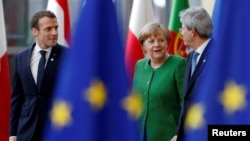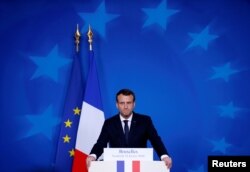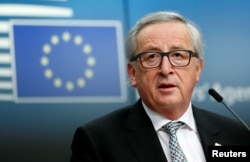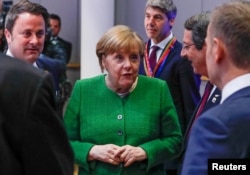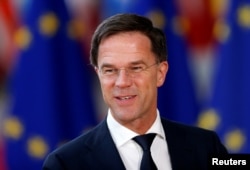European Union leaders staked out opening positions Friday for a battle over EU budgets that many conceded they are unlikely to resolve before Britain leaves next year, blowing a hole in Brussels' finances.
At a summit to launch discussion on the size and shape of a seven-year budget package to run from 2021, ex-communist states urged wealthier neighbors to plug a nearly 10 percent annual revenue gap being left by Britain, while the Dutch led a group of small, rich countries refusing to chip in any more to the EU.
Germany and France, the biggest economies and the bloc's driving duo as Britain prepares to leave in March 2019, renewed offers to increase their own contributions, though both set out conditions for that, including new priorities and less waste.
Underlining that a divide between east and west runs deeper than money, French President Emmanuel Macron criticized what he said were poor countries abusing EU funds designed to narrow the gap in living standards after the Cold War to shore up their own popularity while ignoring EU values on civil rights or to undercut Western economies by slashing tax and labor rules.
Noting the history of EU "cohesion" and other funding for poor regions as a tool of economic "convergence," Macron told reporters: "I will reject a European budget which is used to finance divergence, on tax, on labor or on values."
Poland and Hungary, heavyweights among the ex-communist states which joined the EU this century, are run by right-wing governments at daggers drawn with Brussels over their efforts to influence courts, media and other independent institutions.
The European Commission, the executive which will propose a detailed budget in May, has said it will aim to satisfy calls for "conditionality" that will link getting some EU funding to meeting treaty commitments on democratic standards such as properly functioning courts able to settle economic disputes.
But its president, Jean-Claude Juncker, warned on Friday against deepening "the rift between east and west" and some in the poorer nations see complaints about authoritarian tendencies as a convenient excuse to avoid paying in more to Brussels.
At around 140 billion euros ($170 billion) a year, the EU budget represents about 1 percent of economic output in the bloc or some 2 percent of public spending, but for all that it remains one of the bloodiest subjects of debate for members.
Focus on payments
The Commission has suggested that the next package should be increased by about 10 percent, but there was little sign Friday that the governments with cash are willing to pay that.
"When the UK leaves the EU, then that part of the budget should drop out," said Dutch Prime Minister Mark Rutte, who leads a group of hawks including Sweden, Denmark and Austria.
"In any case, we do not want our contribution to rise and we want modernization," he added, saying that meant reconsidering the EU's major spending on agriculture and regional cohesion in order to do more in defense, research and controlling migration.
On the other side, Czech Prime Minister Andrej Babis said his priorities were "sufficient financing of cohesion policy" a good deal for businesses from the EU's agricultural subsidies.
German Chancellor Angela Merkel said there had been broad agreement that new priorities such as in defense, migration and research should get new funding and she called for a "debureaucratization" of traditional EU spending programs.
Summit chair Donald Tusk praised the 27 leaders — Prime Minister Theresa May was not invited as Britain will have left before the new budget round starts — for approaching the issue "with open minds, rather than red lines." But despite them all wanting to speed up the process, a deal this year was unlikely.
Quick deal unlikely
Although all agree it would be good to avoid a repeat of the 11th-hour wrangling ahead of the 2014-20 package, many sounded doubtful of a quick deal even early next year.
"It could go on for ages," Rutte said. He added that it would be "nice" to finish by the May 2019 EU election: "But that's very tight."
Among the touchiest subjects will be accounting for the mass arrival of asylum-seekers in recent years. Aggrieved that some eastern states refuse to take in mainly Muslim migrants, some in the west have suggested penalizing them via the EU budget.
Merkel has proposed that regions which are taking in and trying to integrate refugees should have that rewarded in the allocation of EU funding — a less obviously penal approach but one which she had to defend on Friday against criticism in the east. It was not meant as a threat, the chancellor insisted.
In other business at a summit which reached no formal legal conclusions, leaders broadly agreed on some issues relating to next year's elections to the European Parliament and to the accompanying appointment of a new Commission for five years.
They pushed back against efforts, notably from lawmakers, to limit their choice of nominee to succeed Juncker to a candidate who leads one of the pan-EU parties in the May 2019 vote. They approved Parliament's plan to reallocate some British seats and to cut others altogether and also, barring Hungary, agreed to a Macron proposal to launch "consultations" with their citizens this year on what they want from the EU.




